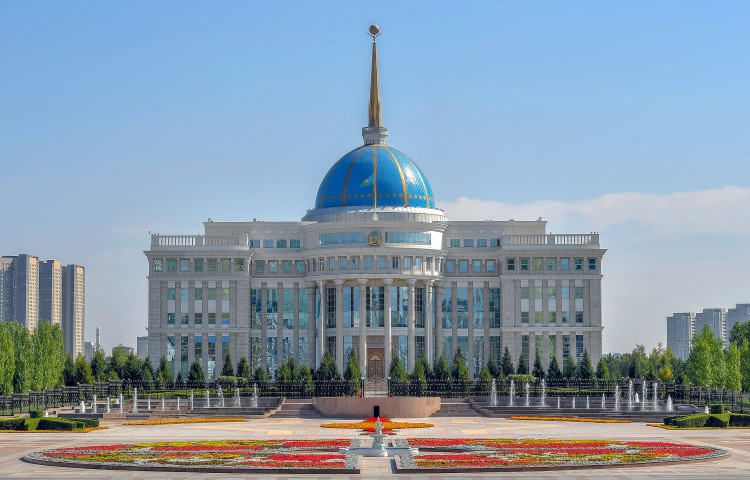ASTANA – Kazakhstan’s Mazhilis, a lower chamber of the Parliament, endorsed a three-year budget plan on Nov. 1. The budget expenditures are expected to grow by 1.3 trillion tenge (US$3.2 billion) to reach nearly 24 trillion tenge ($54 billion) in 2024, according to the draft law.

The Akorda presidential residence. Photo credit: Akorda.
In 2025, the budget spending is estimated at 23.8 trillion tenge ($51.3 billion) and will exceed 25.1 trillion tenge ($54.1 billion) in 2026.
Focus on the social sector
Similar to previous years, more than 40% of the budget expenditures are directed to the social sector.

In 2024, 5.4 trillion tenge ($11.6 billion) is earmarked for the payment of indexed pensions and allowances. To support families during the childcare period, the duration has been extended to 1.5 years at President Kassym-Jomart Tokayev’s initiative, with a planned budget of 93.3 billion tenge ($201.2 million) for the upcoming year.
Another initiative in the social sector is to maintain the retirement age for women at 61 years until 2028, covering over 150,000 people and requiring an additional 473 billion tenge ($1 billion) over the next three years.
“2.4 trillion tenge ($5.2 billion) will be allocated to the development of the healthcare system, including the implementation of the Modernization of Rural Healthcare national project. The national project envisions the construction of 655 healthcare facilities and the modernization of 32 inter-district hospitals. This initiative aims to provide specialized medical assistance to over four million rural residents,” said Minister of Finance Yerulan Zhamaubayev, presenting the bill at the Mazhilis.
The education sector will receive 1.7 trillion tenge ($3.7 billion), largely for the Comfortable School national project. Launched in 2023, the project aims to address the shortage of school places and the problem of three-shift schools in Kazakhstan. The plan involves the construction of 369 schools.
According to the Kazakh finance minister, an allocation of 96 billion tenge ($207 million) is set aside for a 30% increase in the salaries of preschool teachers.
Another 2.8 trillion tenge ($6 billion) will be allocated for the development of the real sector of the economy, particularly to the development of the manufacturing industry and support businesses.
The budget revenues in 2024 are projected at 20.4 trillion ($43.7 billion), with the budget deficit estimated at 2.6% of gross domestic product (GDP).
Socio-economic development scenario
The budget for the next three years has been formulated based on the fundamental scenario of the forecast for socio-economic development. According to this projection, it is anticipated that the country’s GDP will grow 5.3% in 2024 and up to 6% from 2026 to 2028. Consequently, the average annual GDP growth rate is projected to be 5.8%.

In the fundamental scenario, the price of oil is estimated at $80 per barrel. As of Nov. 14, Brent crude, the international benchmark, went down by 0.1% to $82.42 a barrel.
The stipulated range for annual inflation in 2024 is 6-8%, decreasing to 5.5-7.5% in 2025 and further down to 5% from 2026 to 2028. Criticizing the government for failing to keep inflation at an expanded government meeting in December, Tokayev tasked the government to halve the inflation by the end of 2023. As of November 2022, inflation stood at 19.6% and now the figure has gone down to 10.6%.
National Fund transfers
According to the Kazakh Ministry of Finance, government spending is expected to exceed its revenues in 2024 by 3.5 trillion tenge ($7.5 billion), rising to 3.6 trillion tenge ($7.8 billion) in 2025 and reaching 3.9 trillion tenge in 2026 ($8.4 billion).
Part of that deficit will be covered by a guaranteed transfer from the National Fund, which will be two trillion tenge ($4.3 billion) annually, down from 2.3 trillion tenge ($4.96 billion) in 2023.
Guaranteed national transfers from the National Fund in Kazakhstan refer to a mechanism through which a portion of the country’s oil revenues, accumulated in the National Fund, is directed toward financing specific budgetary needs. The National Fund was established in 2000 to accumulate windfall profits from the oil sector and ensure the country’s fiscal stability, particularly during periods of fluctuating oil prices.
The government has been criticized for relying heavily on the transfers, including by President Tokayev.
Experts are cautious about the withdrawals of savings from the National Fund.
“Over the course of three years, the average budget deficit is projected to be 7.7%, while the average revenue growth for the budget will be only 2.7%. It is not entirely clear how the growing budget deficit will be financed in the subsequent years, and whether it will become another reason for using the National Fund funds and new revisions and adjustments to the budget, which has essentially become a norm for the government,” said Kazakh economist Galymzhan Aitkazin.
However, at a plenary meeting of the Mazhilis, Minister of National Economy Alibek Kuantyrov assured the safety of the National Fund’s assets. As of October, the fund’s assets make up $56.3 billion.
According to the Ministry of National Economy of Kazakhstan, the National Fund’s foreign exchange assets are projected to recover to $68 billion in 2024, with a further increase to $80.7 billion in 2025 and $93.3 in 2026.
“In general, the policy of formation and use of the National Fund in the medium and long term is aimed at preserving the funds of the National Fund for future generations,” said Kuantyrov.

